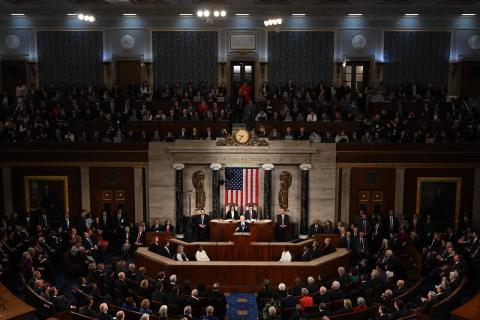Most of the early commentary on Malcolm Turnbull’s changes to Australia’s security and intelligence arrangements focused on his decision to bring together the principal domestic security agencies – ASIO, the AFP, the Australian Border Force, the Australian Criminal Intelligence Commission and others – in a new Home Affairs portfolio. That was natural: for journalists, there was an entertaining sub-text to the story in political tensions within the Liberal Party.
Like any large change to the machinery of government, the new arrangements will be difficult to implement and will generate unanticipated problems in the transition. But the Prime Minister has confirmed that the existing agencies will retain their current structures and statutory independence, so the overall impact will probably not be as great as either supporters or detractors now claim. The decision to have the first law officer – the Attorney-General – continue to issue warrants and ministerial authorisations for ASIO and other intelligence operations rectifies a nagging conflict of interest in the current system under which the Attorney-General has been both authoriser and responsible minister.
Less focus has been given to the 2017 Independent Intelligence Review, conducted by Michael L’Estrange, a former secretary of DFAT, and Stephen Merchant, a retired intelligence officer of vast experience, which was released at the same time. This is a pity, because if fully implemented, its recommendations will amount to the largest changes to Australia’s foreign intelligence and security agencies since the foundational Royal Commissions conducted by Justice Robert Hope in the 1970s and ‘80s.
The L’Estrange/Merchant review concluded that the Australian intelligence agencies were working well but that the changing security outlook, and the increasingly blurred lines between intelligence collection and assessment, foreign and domestic intelligence, and intelligence and law enforcement, imposed new demands on, and required structural changes in, the national intelligence community.
The new Office of National Intelligence
The review recommended the establishment of a new Office of National Intelligence to replace the existing Office of National Assessments, which sits at the centre of the national intelligence enterprise under the Prime Minister.
ONI would retain ONA’s responsibilities for strategic, political and economic assessments but its existing statutory responsibilities for coordinating and evaluating Australia’s broader foreign intelligence activities would be expanded and much better resourced. Its remit would be extended to cover the intelligence functions of other agencies like the Australian Federal Police and Border Force.
The Director-General of ONI would be designated as the formal head of the National Intelligence Community, accountable to the Prime Minister and the National Security Committee of Cabinet for its performance. Critically in Canberra power terms, DG ONI’s capacity to wrangle the other larger agencies like ASD and ASIS would be boosted. He or she would be appointed at departmental secretary level and hold the budgetary purse strings for some new programs.
The review’s other major structural recommendation was that the Australian Signals Directorate (ASD) in the Department of Defence should become a statutory agency within the Defence portfolio. In a sign of the growing centrality of cyber issues, ASD would also incorporate the Australian Cyber Security Centre with its broader public and private sector cyber security responsibilities.
In his statement, the Prime Minister said that the government accepted the recommendations of the review ‘as a sound basis to reform Australia’s intelligence arrangements’, which leaves lots of room for adjustment in the detailed implementation processes he foreshadowed.
Three crucial questions
How should we judge the recommendations of the Intelligence Review? Against three criteria I suggest.
Will they result in higher quality, more useful intelligence which helps policymakers deliver better security, economic and foreign policy outcomes for Australia?
I think so.
Will they preserve the critical distinction between intelligence and policy, so that the products of intelligence collection and assessment aren’t distorted by policy and politics?
Probably, but there are dangers here.
Finally, are any risks mitigated by strong oversight of the intelligence process?
Here the answer is yes, provided the review’s recommendations are fully implemented.
The better quality, better targeted, intelligence should come from improved priority-setting and coordinating arrangements, and from the substantial additional resources the review recommends. These include better data management and ICT connectivity, a joint fund to support shared new capabilities and a 50% increase in the number of ONA analysts.
In the unclassified public version of the report, some delicately written language alludes to the need to ensure that the immediate demands of areas such as counter-terrorism don’t drain resources from ‘important long-term intelligence priorities’ (meaning, one assumes, our larger regional neighbours).
On my second criterion, maintaining the clear distinction between intelligence and policy, there are risks. The review glides a little too easily over some quite basic tensions between the principle of independence, which it fully endorses, and pressures for greater policy relevance. Its authors note the ‘indispensable requirement’ for ‘intelligence assessments to be independent of policy-making’, but also emphasise the need to ‘further accentuate’ the ‘connection between high-quality intelligence assessments and policy-making needs’.
The reconciliation of these two valid but sometimes conflicting requirements will, I suspect, require tougher trade-offs than the reviewers acknowledge, particularly by a Director-General in much closer proximity to the Prime Minister as his ‘principal adviser on intelligence community issues’.
I worked three times in ONA over a period of 30 years and the great strength of the organisation – noted again by L’Estrange and Merchant – lies in its strong culture of intellectual independence and internal contestability. Its small size, flat structure and the room it occasionally finds for passionate eccentrics who know their subject matter deeply, help sustain that culture.
A great deal will depend on whether the ONI preserves and builds on this asset or overwhelms it in a new culture of operational responsiveness.
On my third criterion, robust oversight of the intelligence agencies, the indications are reassuring. The review recommends a significant increase in the staffing of the office of the Inspector-General of Intelligence and Security (IGIS), who has the powers of a standing Royal Commissioner over the agencies, and a broadening of her remit to include the intelligence functions of new agencies. The Prime Minister announced that the office of the IGIS will be moved into the Attorney-General’s portfolio. The review also recommends an increase in the oversight role of the Parliamentary Joint Committee on Intelligence and Security (PJCIS). It baulks at giving the PJCIS direct oversight of intelligence operations, but the stronger connections it proposes between the IGIS and the Committee will be helpful.
We won’t be able to make final judgements about any of these issues until we see the precise terms of proposed legislative changes, the details of the resources the government is prepared to invest, and the character of the people it appoints to the new positions. Structural changes without the resources to back them up will be more dangerous than beneficial.
Australia’s intelligence structures have drawn on strong historic links with Britain and the United States, but they have unique indigenous characteristics. These were established by Justice Hope, a former judge of the NSW Court of Appeal and President of the NSW Council of Civil Liberties. They include a focus on the national interest, a sharp demarcation between the roles of intelligence and policy-making, clear accountability, and strong democratic oversight. L’Estrange and Merchant aptly describe this as an ‘indispensable legacy’.
As the government works through the details of the Review’s important and necessary changes, it needs to reflect as deeply on the strengths of Australia’s own intelligence traditions as it does on any British or American models.

